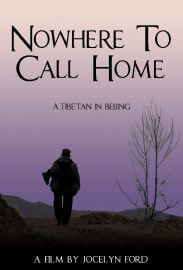Enjoy a free preview via Film Discovery! Click here !
Enjoy a free preview via Film Discovery! Click here !
Enjoy a free preview via Film Discovery! Click here !
Enjoy a free preview via Film Discovery! Click here !

https://www.filmplatform.net/product/nowhere-to-call-home-a-tibetan-in-beijing
Widowed at 28, Tibetan farmer Zanta defies her tyrannical father-in-law and refuses to marry his only surviving son, who is in prison for armed robbery. When Zanta’s in-laws won’t let her seven-year-old go to school, she flees to Beijing to become a street vendor.
Destitute, she inveigles a foreign customer into helping pay her boy’s school fees. Soon the unwitting American journalist faces a tough decision: does she step into the violent family dispute, or watch as Zanta suffers the traditional fate of Tibetan widows.

I have devoted my professional life to being a foreign correspondent because I sincerely believe a better-informed world community is more likely to make better decisions.
The evening I stooped to talk to Zanta as she sold trinkets on a pedestrian overpass I was pondering how little I knew of her world. I had talked with Tibetan Lamas and educated Tibetans. I was familiar with views of overseas Tibetans, but I knew almost nothing about the lives of Tibetans with little formal education, nor of Tibetans who were migrating to China’s developed cities. What was Zanta’s experience? What was she thinking?
That evening I had no idea I would become so deeply involved in Zanta’s life, and that our unlikely encounter would be the genesis for a film. This documentary is a dramatic personal story of a mother, in the face of adversity, seeking to do her best for her child. It also tells of the discrimination faced by families in Zanta’s community with no able-bodied men-folk, and the trials and occasional acts of preferential treatment extended to Tibetans who seek a better living in Han Chinese cities.
Through this story, I hope to make a small contribution to a discussion that may lead to a better-informed world and more enlightened policies, as well as provide food for thought to anyone who has ever reached out to, or is contemplating assisting someone less fortunate.